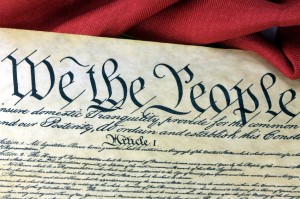The Founding Millennials

Millennials–those of us born roughly between 1982 and the mid-2000s–are on the cusp of taking the reins of government. How will America handle it?
That was the topic of conversation last Thursday in Washington, DC, at “The Young Madisons: A New Generation Stands Up for the Constitution.” The panel discussion was featured as part of the Ninth Annual State of the Constitution, an event commemorating Constitution Day, the 278th anniversary of the signing of our nation’s founding document. Panelists included Congresswoman Tulsi Gabbard (D-HI), Congressman Will Hurd (R-TX), writer and political commentator Mary Katharine Ham, and founding president of the Millennial Action Project Steven Olikara.
So how are we millennials going to run the government? Before you dismiss the political competence of this cynical, selfish, allegedly disengaged “iPhone and craft beer” generation, consider the following.
At our country’s naissance, many of the Founding Fathers were millennials. Thomas Jefferson was thirty-three when he penned the Declaration of Independence. In 1780, at age twenty-nine, James Madison was the youngest delegate elected to the Continental Congress–younger than any sitting member of Congress today. He drafted the Constitution just seven years later at the age of thirty-six. Alexander Hamilton was thirty-three when he collaborated with Madison and John Jay on The Federalist Papers in 1788 and was appointed Secretary of the Treasury a year later.
Like today’s millennials, the Founding Fathers were innovative. They changed not only the existing power structure but also the entire process of the government under which they lived.
The panelists pointed to the concept of ridesharing as an example of how millennials are already revolutionizing private sector processes. Much to the chagrin of entrenched taxicab services, companies like Uber are completely transforming the way the transportation industry does business—and that impact extends into public policy as well. In fact, millennials in Colorado were behind the passage the nation’s first law authorizing ridesharing services.
The impact of millennials on the “Fourth Estate” is also readily apparent—traditional news sources have given way to online media and the blogosphere. And organizations like Wikileaks have forever altered the way information is disseminated and digested.
Now is the time for millennials to apply this creative energy and innovative technology to politics. “Millennials [need] to step up and get involved in the power structures operating the country,” said Rep. Hurd. “And as millennials become part of the power structure, we need to fix the processes by which the government operates so that it is reflective of our times.”
Underlying all of this is the need for a reimagining of the Constitution every few years. “We need to revitalize our constitutional democracy,” says Olikara.
This isn’t exactly a novel idea—he pointed out that Thomas Jefferson proposed that we revisit the Constitution every twenty years and rewrite it from scratch. In that vein, Olikara likened the Constitution to a twenty-year-old house: the foundation may be solid, but the roof needs work, the siding needs painted. You get the idea.
Unfortunately, millennials as a group aren’t particularly civically engaged. For one thing, we are notoriously distrustful of government. We are not as tied to incumbent economic interests as older generations and feel less connected to the existing power structure. And though we are called on to “Get Out the Vote” each election cycle, rarely are we consulted when legislation is drafted. The panelists also suggested that hyper-partisanship is largely to blame for our disillusionment. The atmosphere in the legislature has become so fickle and polarizing as to prevent any legitimate effort to enact long-term policy change. Instead we are stuck debating hot button topics and settling for short-term solutions.
Millennials want to get moving. We prefer a text to a telephone call, Google Chat to email. It’s no surprise then that we find the snail’s pace at which Congress moves completely disenchanting. How do we get Congress to move at our speed? We change it from within.
Through the efforts of the Millennial Action Project and several members of Congress, including Rep. Gabbard, Congress launched the bipartisan Congressional Future Caucus for younger (approximately under the age of forty-five) members in 2013. The Caucus’ purpose is to bring young members of both parties together to focus on long-term policy making.
Is it so farfetched that millennials could force a paradigm shift in American government? Remember, Madison’s Constitution was born of a similar disillusionment with the existing power structure and political process.
The millennials’ future governance has major implications for humanists and other nonbelievers. A recent Pew study indicates that more than one-third of millennials are religiously unaffiliated. The number of “nones,” which includes self-identified atheists, agnostics, and humanists, continues to rise. The changing political climate presents an amazing opportunity for humanist millennials to impact policy in areas about which we care deeply.
As humanists we need to encourage those within our ranks to step up and get involved in the political structure. “Most importantly, don’t waste your talent,” said Rep. Hurd. “Madison had a great gift and he sensed that his skills were required when his country’s existence was on the line. That made him work tirelessly to find solutions.”
We cannot give in to disillusionment. “If we as a generation walk away, what are we as a country left with?” asked Rep. Gabbard. “You have to show up for democracy.”
Speaking of showing up, here’s a fun fact: James Madison was the only delegate to attend every meeting of the Constitutional Convention. Let us all be Young Madisons and be sure to show up too.
